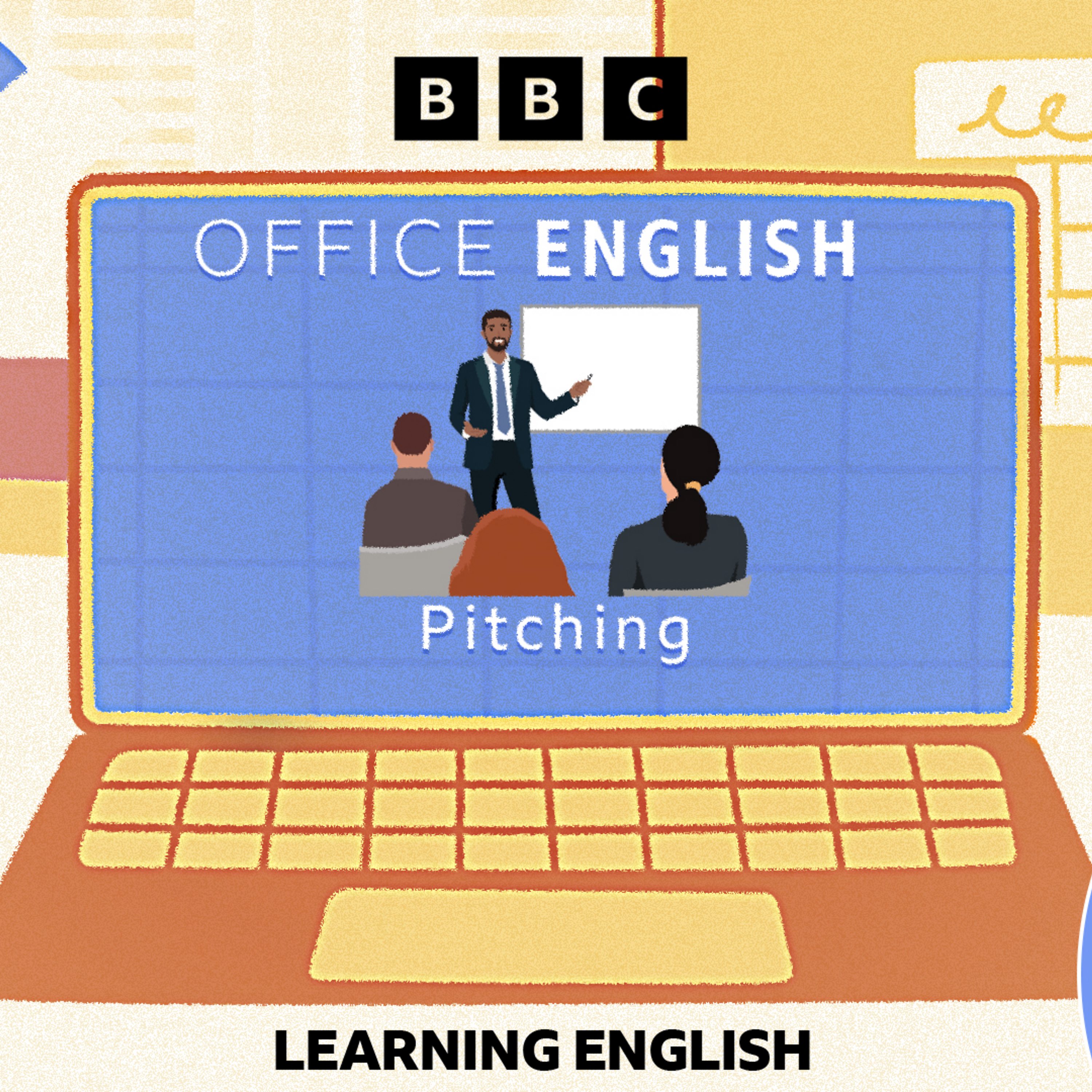
Shownotes Transcript
Thanks for listening to Learning English for Work. Did you know we have a BBC Learning English email newsletter? Subscribe for our latest lessons, worksheets and quizzes and weekly tips to help you study. Just search BBC Learning English newsletter or follow the link in the notes for this programme. Have you ever had to pitch an idea at work? Was it stressful? I think the key to pitching is almost practising.
So talking to people outside of work and seeing if they can understand you. It is stressful because I think until you see the reaction of the person who you're pitching your idea to, even if you think it's brilliant, you have a big, big doubt. Today on Office English, we're talking about how to share your ideas at work.
Hello and welcome to Office English from BBC Learning English, our podcast about the language of work. I'm Phil. And I'm Pippa. You can find a transcript of this episode to read along on our website, bbclearningenglish.com. We've just heard from our BBC Learning English colleagues how they feel about pitching ideas at work.
Have you had to pitch ideas, Pippa? How did you find it? I have had to pitch ideas. I haven't really ever had to do a really formal business pitch that you see sometimes on the television.
But I have had to pitch ideas and I find it a bit stressful. I think if it's an informal setting, then I find it OK. But if there's pressure to come up with ideas, if I'm asked to think of an idea in advance, I find it more stressful than just kind of having a conversation. How about you? Usually when I've pitched things, it's been as part of a sort of structured process. So it's kind of...
You go through all the steps, but in itself it's not that stressful because you're not face-to-face with someone. So sometimes it's easier doing it in an email. OK. Well, today we're going to talk about some tips for pitching and getting your ideas heard. So let's imagine you're in a meeting at work where your boss has asked your team to suggest ideas. How do you start your pitch?
So you want to grab people's attention from the start. So you want to summarise your idea in as short a time as possible. So you might have heard of the idea of an elevator pitch. And this just means explaining your idea in a short amount of time. So imagine getting in the lift or the elevator and going up and you explain your idea in that kind of short period that you're talking to someone in the lift.
Yeah, so you might do that as a question and answer. So, for example, have you ever noticed something? Well, I've found the solution.
Yes. Another way you can do it is to kind of state a clear ambition. So you can say, I want to make, and then state what you want to do. So you're very clear about what you're trying to do. And then maybe if you're in a more informal context, you're kind of saying, I've been thinking a lot about, and then the key issue, and my idea is to, and then you explain your idea.
So we've covered how to open a pitch, but how can you end things, Phil? Yeah, that's a really good question because you don't just want it to trail off. You want to have a clear end to it. So maybe think about the effect that this idea might have. Think about how it could serve your customers. So you might say something like, I think this will be an amazing new way to serve our customers. Or you could talk about
trends in your industry or in society in general and you know this is an idea that could capture that trend and could give people what they're looking for. You could also introduce some urgency to your idea so you could say if we act fast I think we could see real success so you're showing that your idea is exciting. Another way to end a pitch could be to invite questions so
You might want to gauge someone's opinion. Ask them, what do you think? Does it sound like something you'd be interested in? Or just say, you know, I'd welcome any questions you might have about this idea. Yeah, and that's a slightly more formal way of putting it. Pitching can be very stressful, particularly if you don't do it often as part of your job.
Let's hear from our BBC colleagues again. Make sure that what you're suggesting satisfies a need. You have to be careful not to say that the original idea is really bad.
Because it might be the work of the person you're pitching to. I would say stick to the brief, be enthusiastic and just be organised. So Beth and Neil talked about sticking to a brief. So often when you're asked to pitch at work, you'll be given a brief, which is a list of guidelines for the idea, a list of requests for a certain idea.
Yeah, so it's really important when you're making your pitch that you show how you're meeting the brief. You say things like, this will satisfy our need for, or research shows our customers want more, and then you give examples. Yes, another thing you can do is say, I've been thinking about what we're missing in our current offer, and I think this fills that gap. So you can kind of
talk about the stuff that exists already and show how your idea is new. But you don't want to put down other work or ideas. You want to be polite because you might be talking to the person whose idea it was.
Yeah, you might say things like, we've come a long way, but I think working in this way can only get us so far. Yes, another way you could phrase it is saying something like, I want to build on our previous successes with something a bit different. That's it for this episode of Office English and for the series.
We'll be back soon with more programmes to help you improve your business English. In the meantime, we'd love to hear from you. Send us an email to learningenglish at bbc.co.uk and tell us about what confuses you about English in the office. You'll find more resources to help you with your English at work on our website, bbclearningenglish.com. Bye for now. Bye. Bye.
